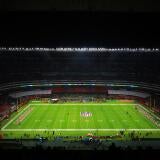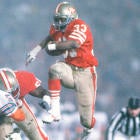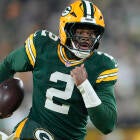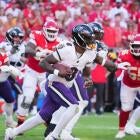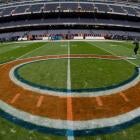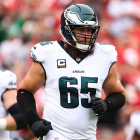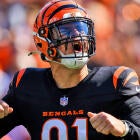Ranking six most overlooked Super Bowl winners: 1984 49ers battle John Madden's 1976 Raiders for top spot
It's time these champions got their due

For whatever reason, some Super Bowl champions are remembered more than others. Teams like the 1966 Packers, 1978 Steelers, 1972 Dolphins, 1985 Bears, and 1999 Rams continue to be celebrated and chronicled by fans and media members alike. Heck, even the 2007 Patriots, who failed to bring home the Vince Lombardi Trophy, continue to earn mention among the NFL's all-time great teams.
Conversely, there have been more than a few teams that have not received enough fanfare. Whether it was their perceived lack of personality, star power or on-field dramatics, these teams are seldom mentioned among the greatest teams of all time. With that in mind, we decided to give some of the Super Bowl's less-heralded championship teams some fanfare while ranking the six-most overlooked Super Bowl champions.
6. 1969 Chiefs
- Final record: 14-3
- Roster included eight Hall of Fame players
- Defeated the previous two AFL champions and the reigning NFL champion in the postseason
The '68 Jets live in infamy as the first AFL team to defeat the NFL in the Super Bowl. But the Chiefs' 23-7 victory over the mighty Vikings in Super Bowl IV (the final game before the two leagues merged) was equally impressive. After dethroning Broadway Joe and the rest of the Jets in the playoffs, the Chiefs edged John Madden's Raiders to capture their second AFL title in four years. Against the NFL champion Vikings, Kansas City forced five turnovers while holding Minnesota to just 239 yards. Mike Garrett and Frank Pitts led a Chiefs rushing attack that churned out 151 yards on a muddy track, while Len Dawson's 46-yard touchdown pass to Otis Taylor put the Chiefs' first Super Bowl win on ice.
In addition to owner Lamar Hunt and coach Hank Stram, the '69 Chiefs boasted eight other Hall of Famers in Dawson, linebackers Willie Lanier and Bobby Bell, defensive tackles Buck Buchanan and Curley Culp, cornerback Emmitt Thomas, safety Johnny Robinson and kicker Jan Stenerud. Kansas City's star-studded defense allowed just 19 points in three playoff games after allowing an average of less than 13 points per game during the regular season.
Why are they overlooked? New York's shocking win a year earlier undoubtedly took some of the shine off the Chiefs' win. The fact that Kansas City was an AFL team probably also has something to do with this team not getting the attention it deserves.
No. 27: 1969 @Chiefs, @SuperBowl IV Champions #ChiefsKingdom
— NFL (@NFL) November 16, 2019
📺: #NFL100 Greatest Teams on @NFLNetwork pic.twitter.com/nX9vBsWffO
5. 1982 Washington Football Team
- Final record: 12-1
- Outscored their four playoff opponents 110-48
- Featured HOF RB John Riggins and league MVP Mark Moseley
Washington overcame a 57-day players' strike to bring home the franchise's first Super Bowl win. The Football Team won their final eight games that included four wins in the NFL's expanded 16-team playoff. After rolling past the Lions and Vikings in the first two rounds, Washington defeated the rival Cowboys (the only team that defeated them during the regular season) in the NFC championship game. After struggling to shake free of the Dolphins during the first three quarters of Super Bowl XVII, Riggins' 42-yard touchdown run on a key fourth-and-1 play allowed Washington to pull away for a 27-17 victory. Riggins rushed for a then-Super Bowl record 166 yards, while Washington's defense did not allow a pass completion during the second half.
Along with Riggins (who amazingly ran for more yards in the playoffs than in the regular season), Washington's '82 team was led by quarterback Joe Theismann and Moseley, the first and only kicker to win league MVP. The roster also featured "The Hogs" offensive line, led by Russ Grimm, Joe Jacoby, Jeff Bostic, Mark May and George Starke. Hall of Fame receiver Art Monk headlined a formidable receiving corps that also included Charlie Brown and Joe Washington, one of the most versatile running backs of his era. Washington's defense was anchored by defensive linemen Dexter Manley and Dave Butz along with defensive backs Tony Peters and Mark Murphy.
Why are they overlooked? The abbreviated season likely took some of the shine off Washington's first championship. Along with the fact that just three of Washington's 22 starters were named to the Pro Bowl.
No. 54: 1982 @Redskins, @SuperBowl XVII Champions #HTTR
— NFL (@NFL) November 9, 2019
📺: #NFL100 Greatest Teams on @NFLNetwork pic.twitter.com/pHZUq8wlc4
4. 1971 Cowboys
- Final record: 14-3
- Featured nine Hall of Famers
- Allowed the Dolphins to score just three points in Super Bowl VI
While the '92 Cowboys might have something to say about it, the franchise's first championship team still might be its best. They went a perfect 10-0 with Roger Staubach as their starter, as Dallas won its final 10 games that included a 24-3 win over the Dolphins in Super Bowl VI. Staubach capped off his first year as the Cowboys' starting quarterback with an MVP performance against a Dolphins team that would win the next two Super Bowls. Staubach threw touchdown passes to fellow Hall of Famers Mike Ditka and Lance Alworth, while running backs Duane Thomas and Walt Garrison combined to run for 169 yards. Super Bowl V MVP Chuck Howley's interception set up the Cowboys' final score, while Hall of Fame defensive tackle Bob Lilly sacked Bob Griese for a Super Bowl record 29-yard loss earlier in the game.
Dallas' '71 roster was loaded with talent. Along with Staubach, Ditka and Alworth, the Cowboys offense featured several other Hall of Famers in receiver "Bullet" Bob Hayes and lineman Rayfield Wright. The Cowboys defense, appropriately nicknamed "Doomsday," featured Hall of Famers Lilly, cornerbacks Herb Adderley and Mel Renfro, and safety Cliff Harris.
Why are they overlooked? The '71 Cowboys are somewhat overshadowed by their '77 championship team that featured Hall Famers Drew Pearson, Tony Dorsett and Randy White. That team also featured Ed "Too Tall" Jones and a colorful linebacker named Thomas "Hollywood" Henderson. The '71 Cowboys' slow start (they went 1-3 with Craig Morton as their starting quarterback) has contributed to them often being left out of the discussion as one of the Super Bowl's greatest champions.
No. 34: 1971 @dallascowboys, @SuperBowl VI Champions #DallasCowboys
— NFL (@NFL) November 9, 2019
📺: #NFL100 Greatest Teams on @NFLNetwork pic.twitter.com/2nt59RR5vi
3. 1998 Broncos
- Final record: 17-2
- Featured league MVP and HOF RB Terrell Davis and HOF QB John Elway
- Outscored their three playoff opponents 95-32
Denver won its second consecutive Super Bowl with little resistance. After a 13-0 start (that included four wins without an injured Elway), Denver lost two games late in the '98 season before rebounding with a Week 17 win over Seattle. In that game, Davis became the fourth player in league history to rush for more than 2,000 yards in a season. In the playoffs, Denver dismantled the Dolphins (who had given them their second loss of the season) 38-3 behind Davis' 199 rushing yards and two touchdowns. After defeating the Jets in the AFC championship game, the Broncos dominated the Falcons in Super Bowl XXXIII on the strength of Elway's 336 passing yards and a defense that forced four turnovers and allowed a single touchdown in garbage time.
Along with Elway and Davis, the Broncos offense showcased Hall of Fame tight end Shannon Sharpe, 1,000-yard receivers Rod Smith and Ed McCaffrey and three Pro Bowl linemen in Tony Jones, Mark Schlereth and Tom Nalen. Denver's defense featured Hall of Fame safety Steve Atwater, Pro Bowl linebacker Bill Romanowski and perennial Pro Bowl pass rusher Neil Smith. The unit allowed a mere two touchdowns in three playoff games.
Why are they overlooked? There wasn't much drama associated with the Broncos' title defense. To no fault of their own, the Broncos didn't get the chance to face the Vikings, the team many considered to be Denver's only worthy challenger. Minnesota, however, did not fulfill its end of the bargain following a 15-1 season, as Dennis Green's Vikings were upset by the Falcons in the NFC championship game. The Broncos' second championship run would be better remembered had it ended with a win over Randy Moss and rest of the Vikings.
No. 14: 1998 @Broncos, @SuperBowl XXXIII Champions #BroncosCountry
— NFL (@NFL) November 16, 2019
📺: #NFL100 Greatest Teams on @NFLNetwork pic.twitter.com/VNa9Q9r8eU
2. 1984 49ers
- Final record: 18-1
- Boasted the league's top-ranked offense and second-ranked defense
- Defeated their three playoff opponents by a combined score of 82-26
A year before the Bears went 18-1, the 49ers became the first team to win 18 games in a season. The 49ers were actually a controversial pass-interference call away from becoming the NFL's first 19-0 team. Led by quarterback Joe Montana and his mastery of Bill Walsh's innovative West Coast offense, the 49ers scored at least 30 points 10 times during the regular season. San Francisco's equally dominant defense allowed the fewest points in the NFL during the regular season. The 49ers defense featured five Pro Bowlers in linebacker Keena Turner and defensive backs Ronnie Lott, Eric Wright, Carlton Williamson and Dwight Hicks. The unit also included Hall of Fame pass rusher Fred Dean and veteran linebacker Jack "Hacksaw" Reynolds.
In the playoffs, the 49ers defeated the Giants and Bears -- the next two Super Bowl champions -- by a combined score of 44-10. They spotted the Dolphins an early 10-7 lead in Super Bowl XIX before scoring 28 of the game's final 34 points. Montana set then-Super Bowl records for passing yards (333) and rushing yards (59) by a quarterback, while running backs Roger Craig and Wendell Tyler combined to gain 270 all-purpose yards with Craig becoming the first player to score three Super Bowl touchdowns. The 49ers defense shut out Miami's record-setting offense in the second half while sacking Dan Marino four times and intercepting him twice.
Why are they overlooked? The early '80s 49ers were similar to the early 2000s Patriots in that they didn't have the biggest names and thus failed to generate many national headlines. The '84 49ers are also a victim of the franchise's success as they are often lost in the shuffle of the 49ers' four other championship teams.
"That team was just loaded!" 💪
— NFL Network (@nflnetwork) November 16, 2019
The 1984 @49ers went 15-1 and became Super Bowl champs 🏆👇 #NFL100
📺: NFL 100 GREATEST TEAMS on NFL Network pic.twitter.com/ZaSjEPJOW4
1. 1976 Raiders
- Final Record: 16-1
- Defeated the defending two-time champion Steelers in AFC title game
- Rushed for a then-record 266 yards in Super Bowl XI
After years of heartbreak, John Madden's Raiders would not be denied in 1976. After stubbing their toe against the Patriots in Week 4, the Raiders would win their final 13 games. In the playoffs, Oakland edged New England in the divisional round before ousting the rival Steelers in the AFC championship game. Playing in their first Super Bowl, the Raiders outclassed the Vikings, 32-14. The Raiders' powerful offensive line overwhelmed Minnesota's famed "Purple People Eaters" defense, while Oakland's defense forced three turnovers that included Willie Brown's 75-yard pick six that put the game on ice.
Oakland's high-scoring offense showcased five Hall of Fame players in quarterback Ken Stabler, receiver Fred Biletnikoff, tight end Dave Casper and linemen Art Shell and Gene Upshaw. The Raiders offense also featured receiver Cliff Branch, one of the league's greatest players who is still not in Canton, Ohio. The Raiders' intimidating defense was led by Hall of Fame linebacker Ted Hendricks, defensive end John Matuszak, linebacker Phil Villapiano and a nasty secondary that was anchored by Brown, Jack "The Assassin" Tatum, Skip "Dr. Death" Thomas and George Atkinson.
No. 8: 1976 @Raiders, @SuperBowl XI Champions #RaiderNation
— NFL (@NFL) November 16, 2019
📺: #NFL100 Greatest Teams on @NFLNetwork pic.twitter.com/9Z1krnInXz
Why are they overlooked? The '70s Raiders were loved by their fans, but loathed by the rest of the NFL. The '76 team led the league in penalties. Their controversial playoff wins over New England (aided by Sugar Bear Hamilton's shaky roughing the passer penalty) and Pittsburgh (the Steelers played without 1,000-yard rushers Franco Harris and Rocky Bleier) may also be why the '76 Raiders don't get more love.





